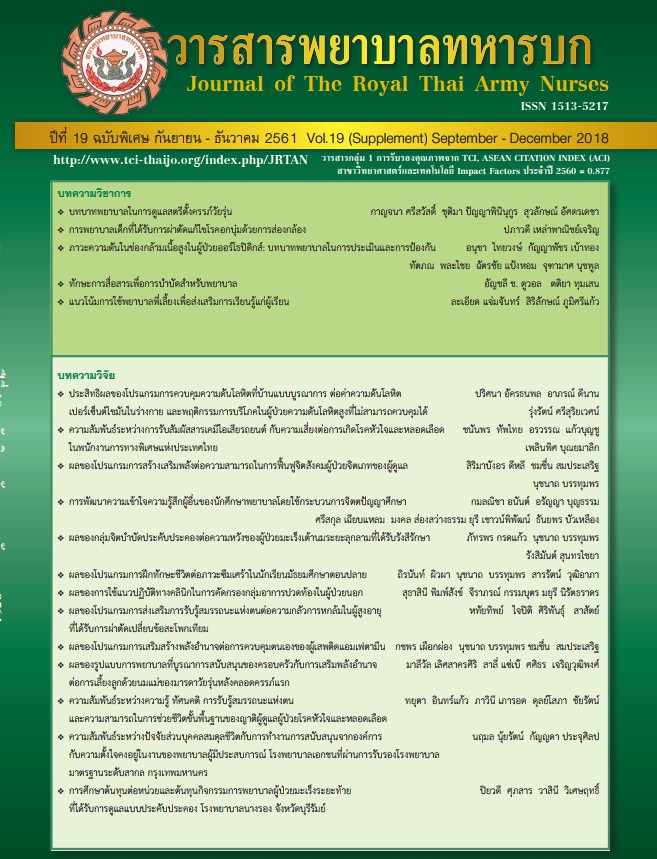Selected Factors Predicting Desired to Self-Regulation among Nursing Students at Eastern Asia University
Keywords:
elf-regulation, factors of learning, nursing studentsAbstract
The purposes of this descriptive predictive study were to examine self-regulation and selected factors predictive from achievement motives, learning Styles and preference – based teaching among nursing students at Eastern Asia University. Simple random sampling was used to recruit 353 nursing students during 2017. Questionnaires were used to collect personal data, learning Styles, achievement motives in learning and self-regulation in learning. The questionnaires were tested for their content validity by a panel of experts. Their Cronbach’ s alpha coefficients were .83, .80 and .92 respectively. Data were analyzed using descriptive statistic and enter multiple regression. The result was found (1) Self-regulation among nursing students at Eastern Asia University was at appropriate level ( = 4.07, S.D. = 0.38) In addition, achievement motives can explain the variation in self-regulation among nursing students at Eastern Asia University of 52% (R2 = .520, p = .05) The results can be used as a guideline for teaching and learning. The activity is appropriate with learning styles and preference – based teaching for nursing student have achievement motives and selfregulation involves relevant theory, laboratory, and practice was a high level.
Downloads
References
2. Sirisupluxana P. Teaching Nursing Students to Develop Critical Thinking Skills. Journal of Boromarajonani College of Nursing, Nakhonratchasima. 2013;19 (2): 5-19. (in Thai).
3. Kunaviktikul W. Teaching and learning in the discipline of nursing in the 21st century. Journal of Nursing. 2015;42 (2): 152-156. (in Thai).
4. Chidmongkol R, Boribal P. Factors Affecting Achievement Motivation of Nursing Students at The Boromarajonani College of Nursing, Udonthani. Journal of the Ministry of Public Health. 2013;22 (1): 98-108. (in Thai).
5. Wongrattanara W, Chittayanunt K. The Learning Styles of Bachelor Program Nursing Students at Boromarajonani College of Nursing, Chakriraj. Journal of Boromarajonani College of Nursing, Nakhonratchasima. 2014;19 (2): 60-72. (in Thai).
6. Bunlikitkul T, Chaoe-sawan N, Singahatanatkit W. Nursing students’ self-regulation learning strategies, Journal of The Thai Red Cross College of Nursing. 2013;6 (2): 35-44. (in Thai).
7. Sriwiset W, Wongcomsin T. Internal Locus of Control, Self-Regulation Learning, Social Skills and Helping Relationship of Nursing Students at a College of Nursing, Ministry of Public Health. Journal of Social Sciences and Humanities. 2014;40 (1): 54-68. (in Thai).
8. Panomrit S, Chareonsuk S, Ananchaipatana N. Self Regulation Learning among Nursing Students who were Different in Perception of Self-Efficacy. Journal of Nursing and Education. 2011;4 (2): 94-107. (in Thai).
9. Zimmerman BJ, Schunk DH, editors. Handbook of Self-Regulation of Learning and performance. 1st ed. New York: Taylor & Francis Group; 2011.
10. McCombs BL, Marzano RJ. Putting the self in self-regulated learning: the self as agent in integrating skill and will. Journal of Educational Psychologist. 2010;25 (1): 51–70.
11. Sinthuchai S, Sawekngam W, Pasiphol S. Development of an Instructional Model Based on Scaffolding and Reflective Practice Approach to Promote Clinical Decision Making Ability of Nursing Student. Journal of The Royal Thai Army Nurses. 2017;18 (2): 134-143. (in Thai).
12. Wongman K. The Effects of Self-Regulation Program on Learning Discipline of Pre-Intermediate Students at Srinapakhetwitaya School (Prariyattidham, Department of Common Study) Buddhism Department, Nakorn Sawan. Thesis of Master Education Degree in Guidance and Counseling Psychology at Srinakharinwirot University; 2010. (in Thai).
13. Eliserio D. Self-Regulated Learning and Mathematics Achievement in a Fourth Grade Classroom. Thesis of Master Education at Doedt college. 2012.
14. Cazan AM. Self regulated learning strategies –predictors of academic adjustment. Journal of Social and Behavioral Sciences. 2012;33 (1): 104-108.
15. Namdej N. Blended Learning for Nursing Students. Journal of Phrapokklao Nursing College. 2014;25 (2): 85-94. (in Thai).
Downloads
Published
How to Cite
Issue
Section
License
บทความหรือข้อคิดเห็นใดใดที่ปรากฏในวารสารพยาบาลทหารบกเป็นวรรณกรรมของผู้เขียน ซึ่งบรรณาธิการหรือสมาคมพยาบาลทหารบก ไม่จำเป็นต้องเห็นด้วย
บทความที่ได้รับการตีพิมพ์เป็นลิขสิทธิ์ของวารสารพยาบาลทหารบก
The ideas and opinions expressed in the Journal of The Royal Thai Army Nurses are those of the authors and not necessarily those
of the editor or Royal Thai Army Nurses Association.






